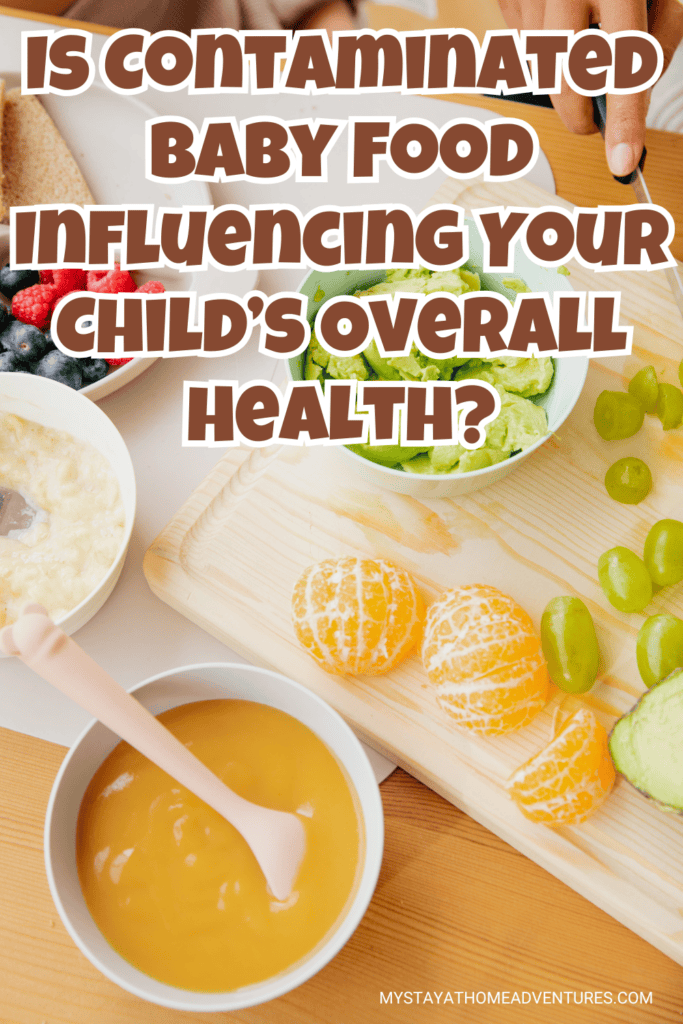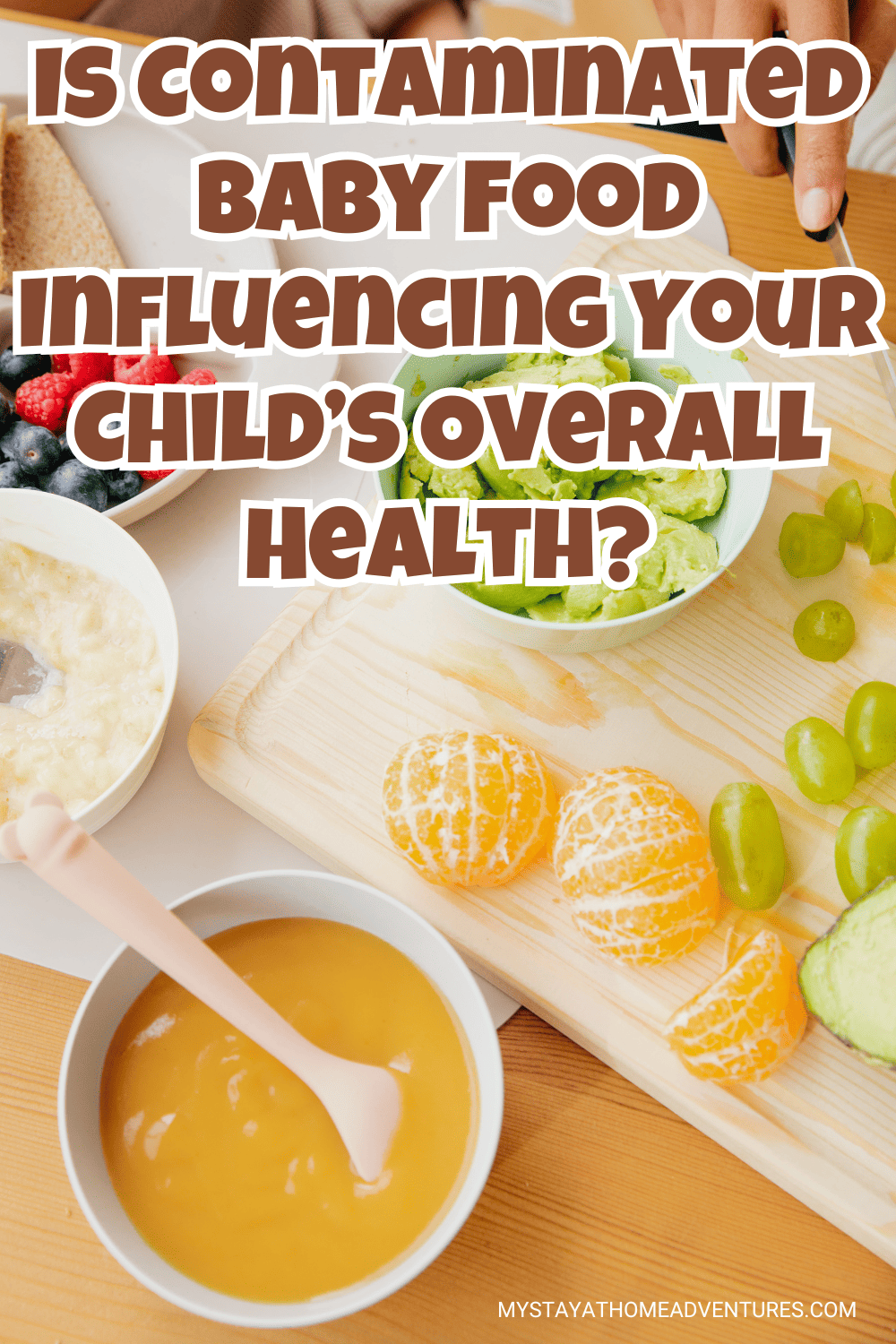Is Contaminated Baby Food Influencing Your Child’s Overall Health?
This post may contain affiliate links which might earn us money. Please read my Disclosure and Privacy policies hereDid you know that the US Food and Drug Administration (FDA) does not have a stringent quality-checking process for baby food? It was only in 2022-23 that the FDA released safety guidelines to address lead contamination in juices and baby foods.
While these guidelines are a positive step, there is growing concern over the lack of similar regulations for arsenic, mercury, and cadmium. This absence of guidance suggests that necessary changes may not be implemented promptly enough to protect consumers.
In this article, we'll look at the potential dangers lurking in those tiny jars and pouches. We will explore what we can do to protect the health and well-being of our kids.

Navigating Infant Nutrition
Infant nutrition requires vigilant scrutiny due to potential heavy metal contamination.
We all know that rice cereal and puffs are among the most savored baby food products. However, in the US, the rice produced has high arsenic levels. Recently, according to Reuters, rice exported to Haiti was found to have dangerous levels of Arsenic.
Even the European Food Safety Authority highlights rice-based products as a significant concern due to their propensity for arsenic accumulation.
Imagine your child feeding on their favorite delicacy oblivious to the inherent life-threatening toxins. The National Library of Medicine states that even seemingly innocuous fruit-based beverages can conceal lead and arsenic.
How Do Heavy Metals Infiltrate Our Infant's Nutrition?
The journey begins in nature's triad: soil, water, and air. Geological processes and human activities contribute to soil contamination, which crops then absorb. Polluted water sources, used for irrigation or food processing, introduce additional risks. Atmospheric deposition further complicates this intricate web.
The food chain amplifies these risks. Plants accumulate contaminants, which animals then consume and concentrate. This bioaccumulation process intensifies as we move up the food pyramid.
Processing introduces another layer of complexity. Industrial equipment, packaging materials, and cleaning agents can leach unwanted elements into food products. Heat treatments may also inadvertently concentrate certain contaminants.
Moreover, TorHoerman Law states that alarming levels of heavy metal concentrations have been found in popular infant food brands. These include Gerber, Beech-Nut, and Happy Family Organics, to name a few. To give you an idea, some Beech-nut products exhibited arsenic levels approaching 900 ppb, with similarly elevated lead content.
Outraged parents are pursuing legal action against these companies, alleging deliberate concealment of product contamination. A toxic baby food lawsuit seeks accountability for the physical, emotional, and financial toll on affected families.
Let us now discuss the havoc these metals cause in children's neurological and immune systems.
Brain Health and Baby's Diet
Heavy metals in infant nutrition pose significant threats to neurological development.
Mercury
Mercury presents a particularly insidious threat to developing brains. Its various forms, all toxic, pose an acute risk to fetuses and young children. As a neurodevelopmental toxicant, mercury can inflict severe damage during critical periods of brain formation.
Fetal exposure to high methylmercury levels has been linked to devastating outcomes. These include congenital malformations, infantile cerebral palsy, and profound neurocognitive deficits. Certain fish-based baby foods, particularly those containing tuna or shark, can be significant sources of mercury exposure.
Lead
BioMed Central reports that lead, a potent neurotoxin, can impair cognitive function even at minuscule levels. Studies indicate that blood lead concentrations as low as 10 μg/dL may result in a significant point reduction in IQ scores.
According to USA Today, common foods like sweet potato puree and carrot-based products often contain elevated lead levels due to soil contamination.
Arsenic
Arsenic, a known teratogen, can readily traverse the placental barrier, posing significant risks to maternal and fetal health. According to Nature, exposure to arsenic has been linked to various pregnancy complications. These include gestational diabetes, anemia, low birth weight, miscarriage, and congenital anomalies.
According to the American Cancer Society, and as stated earlier, rice and rice-related products are rich in arsenic.

Developing Immune Systems and The Toxins
Heavy metals can disrupt the body's defense mechanisms, potentially leaving babies more vulnerable to infections. According to Frontiers, exposure to metals like cadmium may interfere with the immune response to vaccines. This exposes the cornerstone of early childhood health protection.
Scientists have observed concerning trends in antibody production following heavy metal exposure. For instance, babies exposed to lead before birth might produce fewer protective antibodies after receiving routine vaccinations. This could reduce the effectiveness of crucial immunizations against diseases like measles, diphtheria, and hepatitis B.
Beyond vaccine responses, heavy metals may weaken the body's innate immune defenses. This natural first line of protection is vital for fighting off various pathogens. According to ScienceDirect, metal-induced immune suppression could make infants more susceptible to persistent infections caused by viruses and parasites that evade immune clearance.
FAQs
Q. How frequently should parents have their children tested for heavy metal exposure?
Regular testing is routinely not recommended for all children. However, if there are concerns about potential exposure or developmental issues, consult a pediatrician. They may recommend blood tests for lead or other metals based on individual risk factors and symptoms.
Q. Are organic baby foods guaranteed to be free from heavy metal contamination?
Organic certification primarily addresses pesticide use and does not guarantee the absence of heavy metals. Organic foods may have lower contamination risks. However, they can still contain naturally occurring heavy metals from soil. Parents should diversify food sources regardless of organic status.
Q. What role do pediatricians play in addressing heavy metal exposure concerns?
Pediatricians play a crucial role in educating parents about potential risks, recommending appropriate dietary choices, and conducting developmental assessments. They can also order necessary tests, interpret results, and provide guidance on minimizing exposure based on the latest medical research and guidelines.
The impact of heavy metals in baby food extends beyond immediate health concerns, influencing long-term developmental trajectories. As research unveils the complex interplay between early nutrition and lifelong health, the urgency for comprehensive food safety measures intensifies.
Vigilance in food selection and advocacy for stringent regulations becomes paramount in safeguarding our children's future. This multifaceted challenge demands collaborative efforts from parents, healthcare providers, and policymakers to ensure optimal childhood development.






